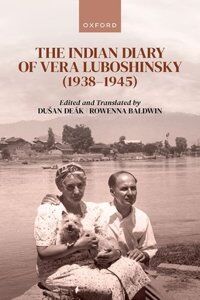Sale!
Indian Diary of Vera Luboshinsky (1938-1945) (Hardback) | Released: 01-Feb-24
By: Dusan Deák (Author) Publisher: Oxford University Press26.00% Off Original price was: ₹ 1,895.00.₹ 1,402.00Current price is: ₹ 1,402.00.
You save ₹ 493.00
The Indian Diary of Vera Luboshinsky narrates life at the Indian princely court of Bhopal, during the 1940s. Vera was the daughter of Professor M. J. Herzenstein, a member of the State Duma in pre-revolutionary Russia, and married to Count Mark Luboshinsky. After the Bolshevik revolution, they emigrated to Czechoslovakia... Read More
In stock
Ships within 1-2 Business Days
100% Orginal Books
Easy Replacement
Certified product
Secure Checkout
On time delivery
Author:
Dusan Deák
Publisher Name:
Oxford University Press
Language:
English
Binding:
(Hardback)
About The Book
The Indian Diary of Vera Luboshinsky narrates life at the Indian princely court of Bhopal, during the 1940s. Vera was the daughter of Professor M. J. Herzenstein, a member of the State Duma in pre-revolutionary Russia, and married to Count Mark Luboshinsky. After the Bolshevik revolution, they emigrated to Czechoslovakia where they met Hamidullah Khan, Nawab of Bhopal, an important political figure during the last decades of the British Empire and India's fight for independence. Impressed by Mark Luboshinsky's managerial abilities, the Nawab invited him to come to India to manage his estates. The couple spent seven years in India (winter 1938 - winter 1945). They stayed in and around Bhopal taking part in palace business or travelling across India accompanying the Nawab's family on long journeys. The Diary is a unique and completely unknown text to the Anglophone world: a rich primary source for historians of India's princely states, providing an interesting and uncommon depiction of the Nawab, his family, acquaintances, associates, and more generally, the life of Indians and foreigners in India during World War II. With literary flair, Vera describes not only her life in India, but also her intimate relationship with the Begum and British residents of Bhopal as well as meetings with well-known people like Jawaharlal Nehru, Sarojini Naidu, Fatima Jinnah, or Anandamayi Ma, and Paul Brunton. Importantly, the Diary also offers an extremely rare Eastern European female voice in late colonial India: a voice that both submits to and transgresses the Orientalist moods of its time.

